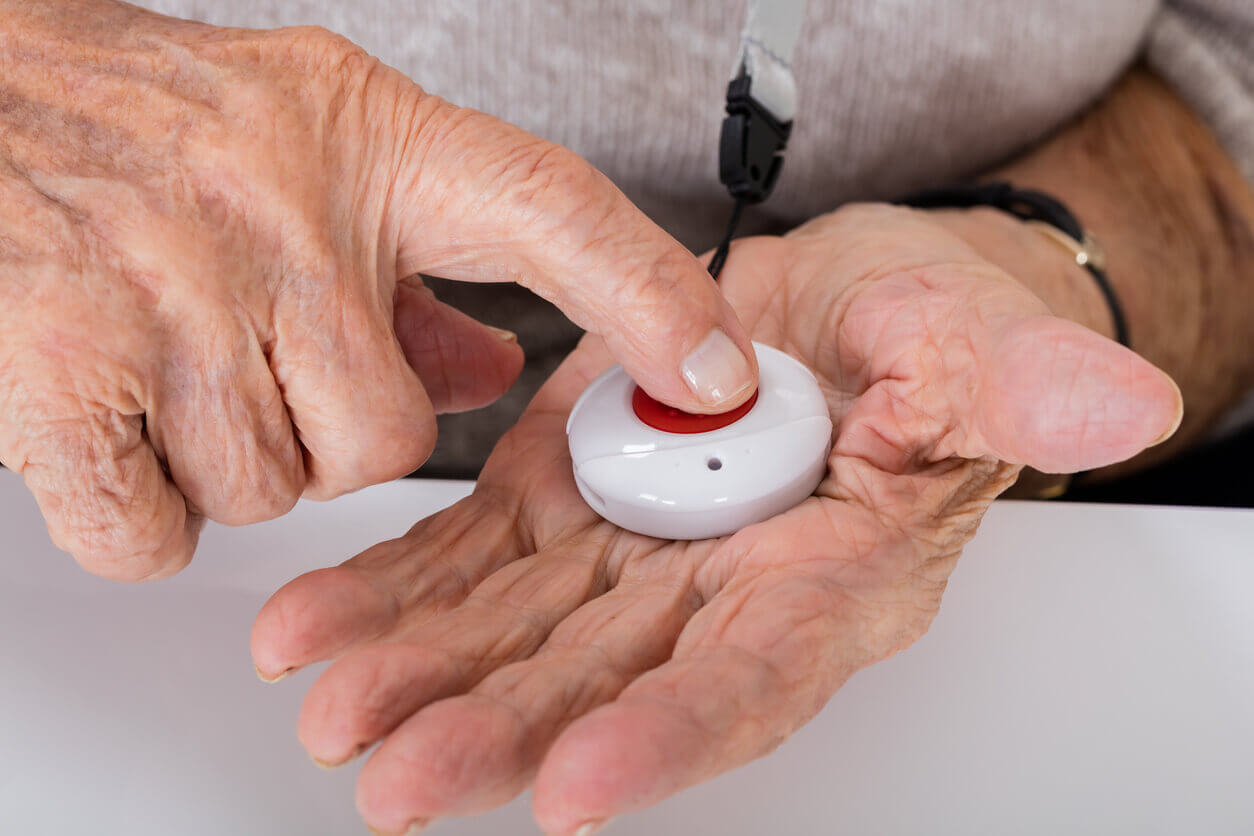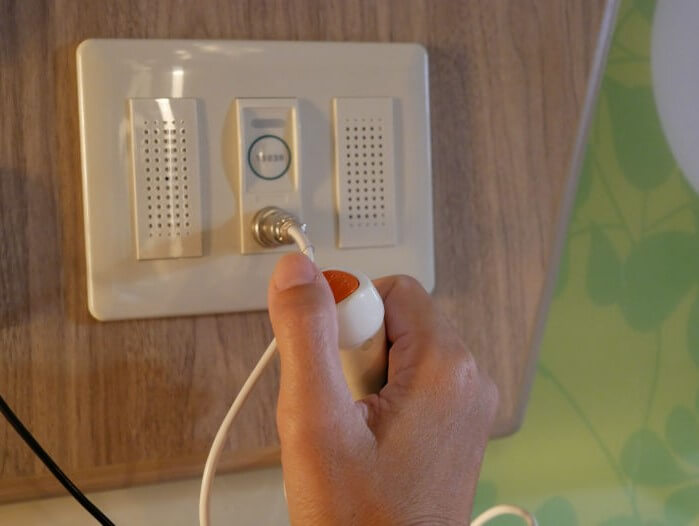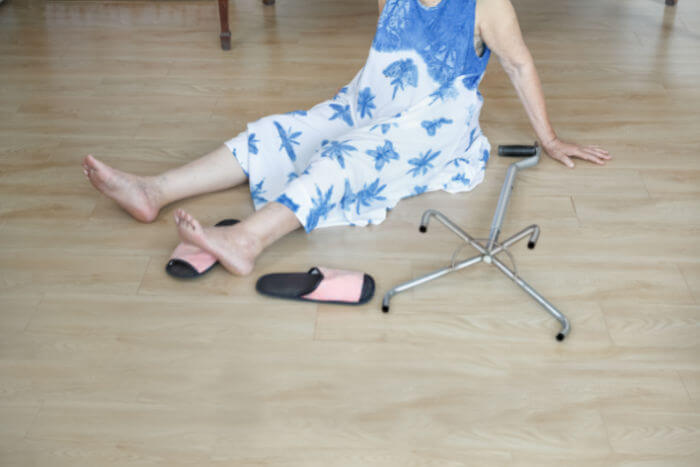Medical Alert Systems for Seniors
Medical alert systems are crucial services that can not only provide peace of mind but potentially save someone’s life at home. As noted by AARP, a medical alert system is an integral elements in any home with seniors who are aging in place, or anyone who may need a fast acting system for medical emergencies. These devices are valuable not only because of their added security, but for the independence they provide to homeowners.
Medical alert systems are an umbrella term used to describe a number of in-home and personal home accessibility devices that both monitor a user’s health and well-being, and enable them to call for help if they need it. With constant advancements in modern technology, there are many different options for alert systems, and homeowners can choose one that best caters to their level of need.
Homeowners or caretakers can choose medical alert devices based on priorities, concerns and/or personal health. For instance, some medical alert systems include fall-censors, some offer two-way communication with a call center, and some even offer GPS technology to assist people when leaving the home.
Installing a medical alert system is a good idea for seniors who live alone, and may need to call for help if a health-related issue or accident occurs. These systems, which range in equipment depending on the individual’s needs, can reassure loved ones that living independently remains a safe and viable option for those who desire to do so.
How Do Medical Alert Systems Work?
Keep in mind that medical alert systems can vary in how they work, depending on the type. However, there is a basic chain of events that happens in the event of an incident or accident. Here is how the medical alert system helps and intervenes:
- A button or similar mechanism is triggered, signifying the need for help.
- The individual in need’s personal data — including their current location — is sent to the particular emergency operators.
- The emergency operator determines what is needed in the situation. Does an ambulance need to be dispatched? Should a loved one be called?
- Emergency contacts or personnel are reached and/or dispatched, depending on the situation.
Medical Alert System Features and Options
Medical alert systems range in performance and abilities, based on the type, make and model. Homeowners or loved ones can pick and choose a specific alert system that best matches the homeowner’s needs and situation. Below we outline a few common options and features for medical alert devices and how they work.
Medical Alert Bracelets and Pendants
The most basic medical alert system consists of a wearable signaling device, such as a bracelet or pendant. Other options include necklaces, keychains and watches, allowing discreet, yet secure options for any situation.
The wearable medical alert device will have a button that the wearer triggers in an emergency situation. The device sends a signal to a base station in your home, a portable cellular base unit, or an in-vehicle system depending on which system you choose.
Medical alert bracelets often include fall detection sensors and GPS data, in case the person wearing it is unable to communicate their injury on their own. GPS data also allows families to keep track of a loved one and their status.
When activated, the base unit or console connects to a monitoring center that is staffed 24/7, day and night, with local medical professionals. Help can be dispatched as necessary and ambulances can be on their way to your home in minutes.
Speakers and Microphones
Some base units also include voice-activated speakers and microphones to allow two-way communication between the user and emergency services. This can be especially valuable if an accident or injury occurs, and the user cannot get up to make a phone call.
Call center operators can summon first responders or designated family members to your residence as well as stay in touch with you until help arrives.
GPS Technology
Many medical alert devices include location data technology and GPS accessibility with live monitoring systems.
Particularly for mobile systems and users who may wander or get lost, having GPS data will help emergency responders or family quickly locate a person, even if they do not know where they are themselves.
Fall Detection
This popular feature is typically available as a wearable device or button, to help with medical emergencies involving a fall. The system will recognize a fall instantly and ask the person if assistance is needed. If there is no reply, they will automatically send for help.
This is particularly crucial for situations where a fall leaves the the subject out of arm’s reach from a button to push for help or unconscious. Keep in mind that fall detection is often an add-on feature that comes with an additional monthly fee.
Waterproof Devices
Slips and falls can often happen in scenarios where a phone is not handy, like the in the shower or tub or by the pool. A waterproof medical alert bracelet can be worn at all times, so you do not have to worry whether the user has taken off their bracelet.
A waterproof medical alert bracelet can be very useful should a medical emergency happen while in that particular situation.
Types of Medical Alert Systems
In addition to considering valuable features of medical alert systems, you should also consider each of the different types. Different types of medical alert systems provide a different kind of coverage and work slightly differently. For instance, some systems work only in the home, while others are mobile and follow the user wherever they may go.
The best type of medical alert system for you depends on the extent of coverage you are looking for, and your loved one’s level of independence. Here is an overview of the basic types of medical alert systems available:
1. In-Home Medical Alert Systems
These medical alert systems are specifically designed to work within the range of your home and connect to a landline or cell phone network.
Typically, they feature a wearable device and an intercom-like base unit within the home. This allows a person to speak to the system’s emergency operator base. These systems are ideal for older adults who do not leave home often.
2. Mobile Alert Medical Devices
A mobile medical alert device works similarly to a home-based system, but it offers more flexibility for those who have a more active lifestyle or likes to leave the house.
These systems typically have their own independent connectivity and do not have to rely on a user’s cell network. They often come equipped with GPS technology to help monitoring services locate the user, even if they are lost.
3. Monitored Medical Alert Systems
A monitored system is a medical alert system that provides 24/7 emergency monitoring services. These emergency personnel are on-call, whenever you may need them due to an accident or incident. As soon as the medical alert device is triggered, a monitored system connects you to emergency services immediately.
This service comes with a monthly cost, but adds the security that a 24/7 call center is there for you whenever you need them.
These systems offer great peace of mind, but may not be necessary depending on the user’s living situation. Still, to avoid having to buy an entire new system – if there is ever a desire to switch from an un-monitored to monitored – it is better to look at systems that offer monitored medical alert system either way.
4. Un-monitored Medical Alert Systems
Compared to a monitored medical alert system, un-monitored services do not have emergency personnel on call. Therefore, you do not have to pay extra on a month to month basis for these services.
Un-monitored medical alert systems are very basic. They typically consist of a wearable device or fixed button. When triggered, the device calls pre-set emergency contacts, like a family member or loved one. They can often be set up to call emergency services if the designated emergency contact does not answer.
How Much Do Medical Alert Systems Cost?
The cost of a medical alert device and service typically involves a one-time fee for equipment and setup and monthly costs for services.
Recurring monthly fees can range between $20 and $100 per month, depending on the features you choose. For instance, monitored services require a monthly fee for the convenience and added safety of 24/7 on-call emergency personnel. Unmonitored medical alerts will cost you less.
Depending on the provider, there may also be a one-time installation and set-up cost of about $100.
Choosing a Medical Alert System
A medical alert system can empower you to live in your home happily and independently. Be sure to explore our guide on how to choose the best medical alert system and provider for your needs. When exploring medical alert systems for seniors, it may be worthwhile to consider other home accessibility modifications at the same time – such as a stair lift or walk-in tub.
Modernize can help you find a medical alert system, as well as the best provider for your needs. Our professionals connect you with trusted medical alert system providers in your area.













